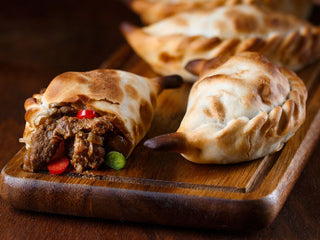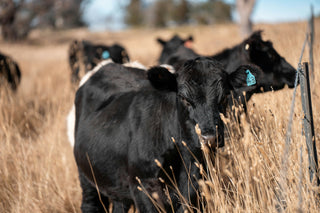From Calf to Culinary Icon
Wagyu beef is revered worldwide for its rich marbling, tenderness, and unforgettable flavour. But behind every cut lies a story of careful breeding, dedicated farming, and respect for the animal. Here we answer the key questions people ask about the life of a Wagyu cow.
Where Does the Life of a Wagyu Cow Begin?
The journey starts at specialist breeding farms in Japan or, in the case of international Wagyu, regions such as Argentina, Australia, and the USA. Calves are typically born into small herds and cared for closely. Japanese Wagyu calves, for instance, are often sold at auction to dedicated fattening farms once they reach seven to ten months of age.
How Are Wagyu Calves Raised?
Wagyu calves are nurtured under low-stress conditions to ensure steady, healthy growth. They are given nutrient-rich feed, plenty of clean water, and regular health monitoring. Farmers often maintain detailed records of lineage, genetics, and growth to preserve the breed’s high standards.
What Do Wagyu Cows Eat?
The diet is carefully managed and changes as the cow matures. Early on, calves may be grass-fed, then gradually introduced to balanced grain mixtures. In Japan, feed often includes rice straw, barley, wheat bran, and maize. In Argentina, Wagyu cattle benefit from the country’s lush Pampas pastures before being finished on grain. This controlled nutrition is crucial for developing the signature marbling.
How Much Space Do Wagyu Cows Have?
Unlike intensive feedlots, Wagyu cattle are generally raised in environments that emphasise welfare and space. In Japan, cows are kept in clean, airy pens, often in small groups to reduce stress. In Argentina, they roam the wide Pampas before a controlled finishing stage. Less stress equals better marbling, so space and comfort are essential.
How Long Do Wagyu Cows Live Before Slaughter?
Wagyu cows are raised far longer than conventional beef cattle. While most commercial cattle may be slaughtered at 18–22 months, Wagyu are typically raised for 28 to 36 months. This extended life allows marbling to develop fully and flavours to intensify.
Is It True That Wagyu Cows Are Massaged or Fed Beer?
This is one of the most common myths. While there are stories of massages and beer, they are not standard practices. The truth is simpler: farmers prioritise calm, healthy animals, which may include brushing to improve circulation and coat health. Beer feeding is rare and not a general rule, it was sometimes used historically in hot regions to stimulate appetite.
What Makes the Life of a Wagyu Cow Different from Regular Cattle?
The difference lies in genetics, diet, time, and care. Wagyu cows live longer, eat customised diets, and are monitored more closely than conventional beef cattle. Farmers’ attention to detail, combined with centuries of selective breeding, creates meat with extraordinary marbling and flavour.
How Are Wagyu Cows Cared for Day to Day?
Farmers provide a low-stress environment with steady routines. Clean water, high-quality feed, shade in summer, and protection in winter are standard. Many Wagyu farms also keep herds small, allowing farmers to track each animal individually.
What Role Does Genetics Play in a Wagyu Cow’s Life?
Genetics are central. True Wagyu cattle come from four main Japanese breeds, the most famous being the Kuroge Washu (Japanese Black). Careful breeding ensures that the natural predisposition for intramuscular fat is passed on, allowing the cow to develop marbling that no other breed can replicate. In Argentina, Wagyu genetics are often crossed with Black Angus, combining tenderness with robust beef flavour.
Do Wagyu Cows Have a Better Quality of Life?
In many ways, yes. Because stress has a direct impact on marbling, Wagyu cows are usually raised with more attention to welfare than commercial beef cattle. Spacious housing, controlled diets, and attentive care all contribute to a higher standard of life.
Why Does the Life of a Wagyu Cow Matter to the Consumer?
Every stage of a Wagyu cow’s life influences the final product. A stress-free environment, nutrient-rich diet, and longer rearing time all translate directly into the buttery texture and rich flavour consumers expect. Understanding this life story also highlights why Wagyu commands a premium price, it reflects years of care, tradition, and dedication.
The life of a Wagyu cow is unlike that of any other cattle breed. From the careful breeding of calves to the long, slow process of rearing, every step is about patience and precision. Whether raised in Japan or on the Pampas of Argentina, Wagyu cattle embody a philosophy of respect, tradition, and pursuit of excellence.
That’s why when you sit down to enjoy a Wagyu steak, you’re tasting not just extraordinary beef, but also the result of years of craft and care.

 0208 540 1222
0208 540 1222


